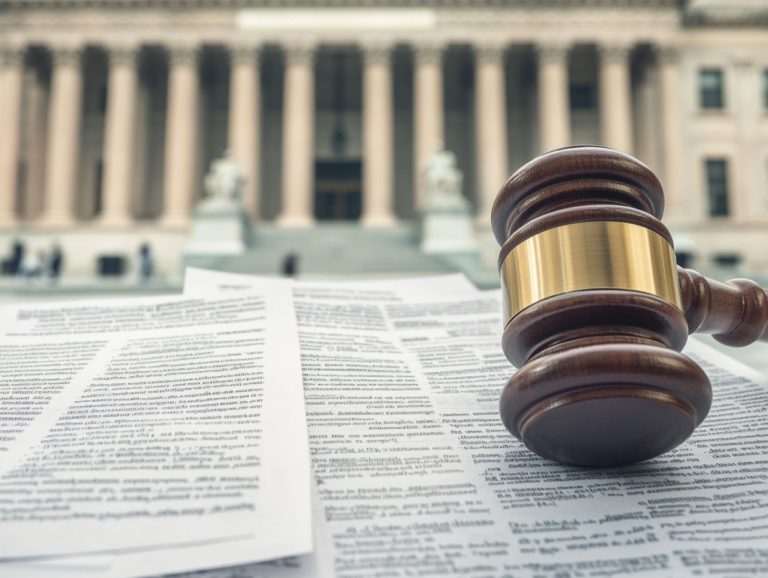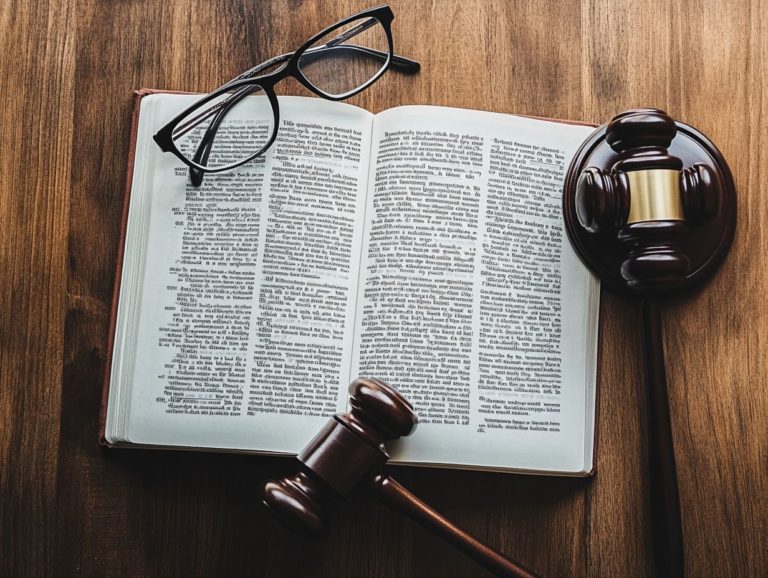What is the Role of a Defense Attorney?
In the complicated world of law, defense attorneys serve as critical guardians of individual rights. Whether navigating through the complexities of criminal charges or addressing civil disputes, these legal professionals are indispensable advocates for their clients.
This piece delves into the multifaceted roles that defense attorneys fulfill, examining the types of cases they manage and the skills that underpin their effectiveness. From adept courtroom representation to strategic negotiation tactics, you ll uncover how defense attorneys skillfully navigate the legal system, championing justice for those they represent.
Contents
Key Takeaways:
- A defense attorney represents individuals accused of crimes or involved in civil lawsuits.
- They handle a variety of cases, using legal knowledge and communication skills to advocate for their clients.
- Their role includes investigation, negotiation, and courtroom representation.
The Basics of a Defense Attorney
A criminal defense attorney serves as your essential ally in navigating the complicated world of legal representation when facing criminal charges. They ensure that your constitutional rights are protected throughout the criminal justice process.
These skilled attorneys expertly navigate complex legal environments, crafting effective defense strategies, conducting thorough case assessments, and offering emotional support when you need it most.
By leveraging their legal expertise, they can negotiate favorable plea deals an agreement where the defendant pleads guilty to a lesser charge to avoid a trial and manage court appearances, all aimed at securing the best possible outcomes for your case.
Their unwavering commitment to upholding justice and maintaining the integrity of the legal system demonstrates their dedication to your rights and well-being.
What is a Defense Attorney?
A defense attorney, especially a criminal defense attorney, specializes in providing legal representation for individuals charged with criminal offenses, whether they range from misdemeanors to serious felonies serious crimes that can result in significant punishment.
These legal professionals are essential in safeguarding your rights throughout the judicial process, ensuring that you receive a fair trial.
Their expertise in criminal law gives them the power to navigate the complexities of the legal system, construct persuasive defenses, and negotiate skillfully with prosecutors on your behalf.
With extensive training and relevant qualifications, they dedicate themselves to understanding the nuances of your case, advising you on the potential outcomes related to your specific charges.
By prioritizing effective representation, they aim to achieve the best possible results, ultimately helping to mitigate the consequences you may face.
Their Role in the Legal System

The role of a defense attorney in the legal system is nothing short of critical; they harness various legal strategies to ensure you receive a fair trial and that your rights are protected at every stage of the criminal proceedings.
Beyond simply representing you in court, these attorneys meticulously craft a range of legal documents, such as motions, briefs, and appeals, all critical for constructing a robust defense.
They dive deep into investigations to gather evidence and interview witnesses to strengthen your case. In negotiations, they are instrumental in brokering plea deals, always striving to secure the most favorable outcomes for you.
In essence, defense attorneys act as both advocates and trusted advisors, skillfully navigating the complexities of the legal system to provide you with comprehensive support and guidance throughout the entire process.
Types of Cases a Defense Attorney Handles
Defense attorneys manage an impressive array of cases, primarily focusing on criminal matters that encompass serious charges, including felonies and misdemeanors.
They also navigate civil cases that often intersect with the complexities of the criminal justice system, demonstrating their versatility and expertise in a multifaceted legal landscape.
Criminal Cases
Criminal cases are a core part of a defense attorney’s work. They include serious felonies like robbery and assault, as well as lesser misdemeanors such as petty theft and traffic violations.
Understanding the differences between felonies and misdemeanors is crucial. Felony charges often lead to severe penalties, while misdemeanors usually result in lighter fines and shorter jail time.
This distinction affects not just immediate consequences but also long-term outcomes like job opportunities and civil rights restoration. Defense attorneys use various strategies, such as plea bargains and case dismissals, tailored to each situation.
By carefully reviewing evidence and applying legal precedents, they aim for the best results for their clients.
Civil Cases

While your main focus may be criminal cases, you can also assist clients in civil matters. This dual role lets you navigate the complex legal landscape where civil and criminal law meet.
For example, if a client faces a civil lawsuit for negligence while being investigated for related criminal charges, your expertise is vital. You protect your client’s rights in both areas.
Building a strong attorney-client relationship is key. Trust allows open communication, crucial for developing effective strategies.
Skills and Qualities of a Good Defense Attorney
A successful defense attorney combines various skills and qualities. These include a solid understanding of the law, communication abilities, and strong negotiation skills.
Each element is essential for effective courtroom strategies and managing cases.
Legal Knowledge and Experience
Knowledge and experience in criminal law are critical for a defense attorney. They enable you to assess cases thoroughly and create effective defense strategies tailored to your clients.
This foundation helps you navigate the legal system and interpret laws that can influence case outcomes. A solid law education, paired with hands-on training, enhances your understanding of trial procedures, evidence evaluation, and negotiation techniques.
As you gain experience, you learn about judges’ and opposing counsel’s behavior. This insight can strategically guide your case.
Ultimately, these qualifications enhance your ability to advocate passionately and ensure strong representation for your clients.
Communication and Advocacy Skills

Strong communication and advocacy skills are essential for a defense attorney. They help you connect with clients, negotiate with prosecutors, and present your case persuasively in court.
Effective communication builds trust and understanding. When clients feel secure to voice their concerns, it creates an environment for emotional support, ensuring they feel heard throughout their legal journey.
In court, your ability to articulate arguments clearly can significantly impact how a judge or jury perceives the case. These skills also help you simplify legal language for your clients, fostering a collaborative relationship.
The Defense Attorney’s Role in the Legal Process
The defense attorney has many important roles in the legal process. They conduct thorough investigations, carefully review evidence, and negotiate to secure the best outcomes for their clients.
Investigation and Research
Investigation and research are vital for defense attorneys. You need to examine the prosecution’s evidence closely and gather relevant information to build a strong defense.
By using various investigative techniques such as interviewing witnesses and reviewing police reports you’ll discover crucial inconsistencies in the prosecution’s case. You may also conduct database searches for key records and consult experts to challenge presented evidence.
Using effective strategies like developing a compelling case theme and creating a timeline can elevate your defense. This careful process ensures every detail is reviewed, giving you the power to advocate effectively for your clients in court.
Negotiation and Plea Bargaining
Negotiation and plea bargaining are key parts of a defense attorney’s responsibilities. You aim to secure favorable plea deals while exploring all legal options.
These processes can reduce the consequences of criminal charges and lessen the emotional and financial stress on clients. By assessing evidence strength and understanding judicial tendencies, you can navigate the judicial system effectively.
Negotiating a plea deal can lead to lighter charges or reduced sentences, paving the way for better outcomes for your clients. This highlights the critical role of negotiation in effective legal defense.
Courtroom Representation
Courtroom representation is one of the most important roles you ll encounter as a defense attorney. In this setting, you advocate for your clients during the trial process, using effective tactics to build a strong case.
Your responsibilities include much more than just representing clients. You carefully look at evidence, create strategic arguments, and question witnesses in court to find any mistakes in their stories. Each interaction is an opportunity to challenge the prosecution’s narrative and address any inconsistencies.
Staying alert is crucial; you must continually assess courtroom dynamics and adjust your strategies to strengthen your client s position. Ultimately, your goal is to champion justice and fight for your client’s rights with unwavering dedication.
Frequently Asked Questions
- What does a defense attorney do? A defense attorney is a legal professional responsible for defending individuals or organizations charged with a crime in a court of law.
- What are the main duties of a defense attorney? The main duties include representing clients during court proceedings, providing legal advice, negotiating plea deals, and building a strong defense strategy.
- Do defense attorneys only represent guilty clients? No, defense attorneys have a legal and ethical obligation to provide a defense for their clients, regardless of their guilt or innocence. They must ensure their clients’ rights are protected throughout the legal process.
- Can a defense attorney drop a case? Yes, a defense attorney can withdraw from a case if there is a conflict of interest or if the client’s wishes contradict their professional obligations. However, they must request permission from the court before doing so.
- How does a defense attorney differ from a prosecutor? A defense attorney defends the accused, while a prosecutor represents the government and seeks a conviction. Defense attorneys adhere to different rules and ethical standards than prosecutors.
- What qualities make a good defense attorney? A good defense attorney should have excellent communication and negotiation skills, critical thinking abilities, and a thorough understanding of the law. They should also be empathetic, dedicated, and detail-oriented.






